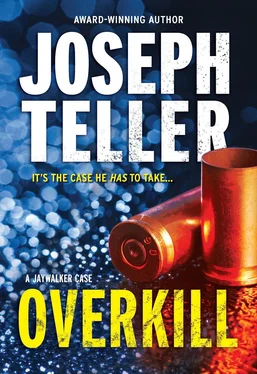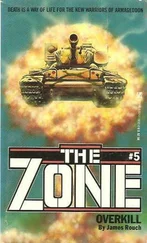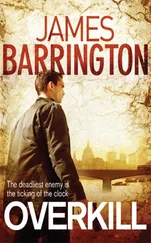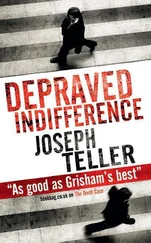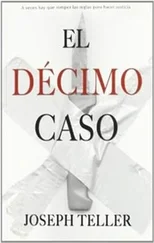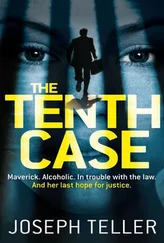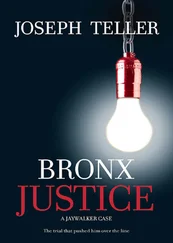Joseph Teller - Overkill
Здесь есть возможность читать онлайн «Joseph Teller - Overkill» — ознакомительный отрывок электронной книги совершенно бесплатно, а после прочтения отрывка купить полную версию. В некоторых случаях можно слушать аудио, скачать через торрент в формате fb2 и присутствует краткое содержание. Жанр: Криминальный детектив, на английском языке. Описание произведения, (предисловие) а так же отзывы посетителей доступны на портале библиотеки ЛибКат.
- Название:Overkill
- Автор:
- Жанр:
- Год:неизвестен
- ISBN:нет данных
- Рейтинг книги:3 / 5. Голосов: 1
-
Избранное:Добавить в избранное
- Отзывы:
-
Ваша оценка:
- 60
- 1
- 2
- 3
- 4
- 5
Overkill: краткое содержание, описание и аннотация
Предлагаем к чтению аннотацию, описание, краткое содержание или предисловие (зависит от того, что написал сам автор книги «Overkill»). Если вы не нашли необходимую информацию о книге — напишите в комментариях, мы постараемся отыскать её.
Overkill — читать онлайн ознакомительный отрывок
Ниже представлен текст книги, разбитый по страницам. Система сохранения места последней прочитанной страницы, позволяет с удобством читать онлайн бесплатно книгу «Overkill», без необходимости каждый раз заново искать на чём Вы остановились. Поставьте закладку, и сможете в любой момент перейти на страницу, на которой закончили чтение.
Интервал:
Закладка:
That said, his lunch this day would consist of a container of iced tea, sipped as he sat on a windowsill on the eleventh floor. The liquid would keep his kidneys from shutting down, the sugar would get him through the afternoon session, and the lemon would protect him against scurvy. And don’t think you can’t get scurvy at 10 °Centre Street, along with just about every other malady known to Western civilization.
When jury selection resumed that afternoon, Jaywalker lost no time in asking the kind of questions that had become his trademark. They weren’t the information-seeking questions that Harold Wexler and Katherine Darcy had asked, and the answers they elicited were of almost no consequence. Instead it was the questions themselves, and the information contained in them, that were important. And like everything Jaywalker did when he was on trial, this was no accident.
He began by reminding the jurors that this was a murder case in which one young man had taken another’s life. He added the fact that the fatal shot had been fired at extremely close range and had struck the victim between the eyes. Then, just before drawing an objection from Darcy that he was testifying-an objection that Wexler no doubt would have sustained-he turned the information into a question.
“Now, Ms. Leach, does hearing any of that make you feel that perhaps this isn’t the kind of case you should sit in on?”
Even before Ms. Leach had finished assuring him that she was perfectly capable of judging such a case, Jaywalker was moving on. “Suppose I were to tell you, Mr. Lowden, that my client is in fact the young man who fired that fatal shot? Does that end the case for you? Or do you want to know more? Do you want to know what led up to that shot?”
Of course Mr. Lowden wanted to know more. And so did the other fifty-seven jurors in the room, who now-not because of any answer from Mr. Lowden, but by the very asking of the question itself-knew that the case was no longer about who had killed Victor Quinones, but about the events that had preceded the killing. Just like that, Jaywalker had changed it from a whodunnit to a yesbut.
Still in the guise of asking questions, he told them about Jeremy’s prior marijuana case, which the judge had ruled Ms. Darcy could ask about. It turned out Jeremy had pleaded guilty to the charge in exchange for doing two days of community service. Some lawyer, perhaps Alan Fudderman, had done him no favor there. He told them about Jeremy’s having gotten rid of the gun, having fled the city, and having spent seven months hiding out in Puerto Rico. He told them about Miranda and how, as Jeremy’s girlfriend, she’d witnessed the incident from start to finish. But, he told them, her whereabouts were now unknown, and neither side would be calling her as a witness.
“Are you going to hold that against my client, Mrs. Fisher?”
Mrs. Fisher assured him that she wouldn’t.
What he didn’t tell them was that the reason Miranda’s whereabouts were unknown was that Jaywalker had decided not only that he didn’t want to call her as a witness, but that he didn’t want Katherine Darcy calling her, either. So he’d struck a deal with her. He’d fulfilled his part of the bargain by making good on his earlier promise to get her into Rikers Island to see Jeremy. It had required a bit of an identity switch, arming her with identification belonging to Jeremy’s twin sister, Julie. But it had worked. Which was good, because had it not, both Miranda and Jaywalker would have been looking at serious felony time. Miranda’s part of the bargain was that after seeing Jeremy and returning Julie’s identification, she was to disappear, to vanish. And she had.
Finally Jaywalker told them about one witness he was going to call. “And the name of that witness-” and here he paused just a beat for effect, being careful not to overdo it “-is Jeremy Estrada.” He asked them if they could listen to him with their minds open despite his prior brush with the law, despite his quiet voice, his habit of speaking slowly, and his perhaps not being the smartest kid they’d ever come across. In the run-up to a presidential debate they might have called all of that lowering expectations, and the phrase could be applied pretty well to trials, as well.
One by one the jurors assured Jaywalker that they could still be open-minded, just as they did when he told them they would witness sobbing from the victim’s grieving parents, see gruesome photos of the deceased, learn grisly details from the medical examiner, and hear the word execution from the prosecutor’s lips. The jurors’ assurances, once again, were hardly the point. The idea was to get these things out in the open now, to strip away from them as much of their shock value as Jaywalker possibly could. And to get the jurors to remember, as each of the things would in turn come up during the course of the trial, that they already knew that and had promised not to be influenced by it. So implicitly, without even being aware of what they were doing, the jurors were agreeing to discount the prosecution’s evidence-not in the sense of ignoring it altogether, but in the other, more literal meaning of the word: to devalue it, to mark it down drastically even before Katherine Darcy had had a chance to call a single witness to the stand.
Of such little things are trials won or lost.
This was Monday. It would take them until late Thursday afternoon to complete the process. It was a murder trial, after all, a class A felony that carried a mandatory life sentence, and each side had the full complement of twenty peremptory challenges to use. And the thing was, there wasn’t that much daylight between the type of jury Jaywalker was looking for and the one Katherine Darcy wanted. Sure, Jaywalker preferred renegades, loners, anti-establishment types, while Darcy was seeking people more compliant and less likely to question the government’s case. But notwithstanding that difference, their concerns were remarkably similar. Both the defendant and the victim were Latin Americans; both had been young at the time of the incident; both had had prior encounters with the law that included drug arrests; and both had sympathetic family members who would testify at the trial. Those similarities made for less-than-obvious choices when it came time to either challenge or accept a particular juror, and for the better part of four days the lawyers engaged in something of a cat-and-mouse game, trying to shape the final product in sometimes subtle ways.
Throughout the process, Jaywalker was struck by how controlled Darcy was. Not just conservative in her choices, but careful about how she played. Her guiding principle seemed to be retaining a numerical edge over Jaywalker at all times. The challenges were exercised in rounds, meaning that both sides were presented with eighteen prospective jurors at a time and forced to strike those they didn’t want, right then and there. Faced with such a now-or-never dilemma, Jaywalker felt compelled to challenge jurors about whom he was on the fence. He couldn’t afford to let someone slip by who might turn out to be a closet law-and-order type who couldn’t wait to take over deliberations and engineer a conviction. Darcy, on the other hand, seemed more preoccupied in guarding her challenges so that when the end game came, as it finally did on Thursday afternoon, she would have a greater say in the last few jurors selected.
That said, they ended up with a jury that, had you woken Jaywalker up during the middle of the night and asked him for his opinion, he would have had to admit that while he wasn’t in love with any of them individually, as a group they weren’t all that bad. There was William Craig, 53, white, an electrical engineer, and by virtue of having been the first juror called to be selected, the foreman; Lucille Hendricks, 67, black, a retired elementary school teacher; Gladys Leach, 44, white, a homemaker; George Gonsalves, 38, Hispanic, a Wall Street trader; Miriam Goldring, 51, white, a registered nurse; Sanford Washington, 60, black, a probation officer; Lillian Koppelman, 58, white, a sales clerk; Vincent Tartaglia, 33, white, unemployed; Consuela Marrero, 24, Hispanic, an administrative assistant and college student; Desiree Smith-Hammond, 32, black, a waitress and aspiring actress; Walter van der Kaamp, 72, white, a retired history professor; and Jennifer Wang, 28, Asian, a Web site master. Five men, seven women. Six white, three black, two Hispanic, one Asian. Average age, 45. All things considered, they could have been a lot worse. Jaywalker had had juries that were all white; juries stacked with government employees, bankers and actuaries; juries so timid or fearful that their responses to questions were all but inaudible; and juries whose average age was deceased. Against that sort of standard, Jeremy Estrada’s jury struck him as pretty good.
Читать дальшеИнтервал:
Закладка:
Похожие книги на «Overkill»
Представляем Вашему вниманию похожие книги на «Overkill» списком для выбора. Мы отобрали схожую по названию и смыслу литературу в надежде предоставить читателям больше вариантов отыскать новые, интересные, ещё непрочитанные произведения.
Обсуждение, отзывы о книге «Overkill» и просто собственные мнения читателей. Оставьте ваши комментарии, напишите, что Вы думаете о произведении, его смысле или главных героях. Укажите что конкретно понравилось, а что нет, и почему Вы так считаете.
